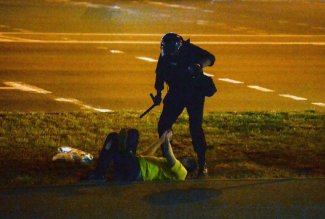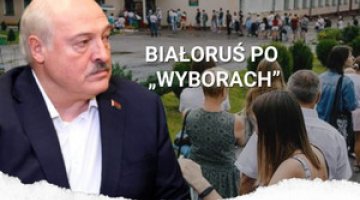A third night of protests in Belarus

During the evening and night of 11 August there were repeated post-election protests. Outside Minsk, demonstrations also took place in regional (Hrodna, Brest, Mahiliau) and district cities (including Lida, Baranavichy, Smarhon, Osipovichy and Vaukovysk). However, fewer protesters took to the streets, in numbers ranging from several hundred in the smaller towns to several thousands in the larger ones. In Minsk, several thousand demonstrators operated in at least several groups, dispersed throughout various districts of the city. The security forces quickly applied direct coercion, including the use of flashbang grenades and rubber bullets. There has also been a marked increase in attacks on journalists, as well as a unprecedentedly high level of aggression by the militia, who regularly stopped drivers and motorcyclists. Many random people were subjected to beatings and detentions, and there are also reports that rubber bullets were fired at apartment windows and cars passing near the demonstrators. Reports (partially confirmed) have appeared online about attempts to initiate strikes in several state-owned industrial plants.
According to data from the Ministry of the Interior, presented on the afternoon of 11 August, a total of over 5000 people have been detained throughout the country in recent days, almost half of whom were in Minsk. Reports about overcrowding in detention centres and the brutal treatment of detainees, who have been deprived of legal aid and have had the delivery of parcels by their relatives blocked, have also appeared online.
In the morning of 11 August, the Lithuanian government reported that Sviatlana Tsikhanouskaya had left for Vilnius the day before (she had moved her children there during the election campaign). Her decision was made under pressure from the Belarusian authorities, as well as the candidate’s fear for her own safety. She was also forced to make an appeal to the citizens to abandon their protests. At the same time, Tsikhanouskaya’s campaign staff called for a dialogue to be initiated between the regime and the opposition in order to arrange a peaceful handover of power.
The law enforcement forces’ brutal actions against the protesters have prompted the EU to firm up its position. In a statement published on 11 August, the EU’s High Representative for Foreign and Security Policy, Josep Borrell, suggested the possibility of introducing sanctions against those responsible for the repression. In response to the growing criticism from abroad, the Belarusian Ministry of Foreign Affairs called in an official communiqué for a more ‘balanced’ approach.
Commentary
- The fall in the number of protesters shows that the increasingly brutal actions of the security forces and the accompanying mass detentions are having some effect. As a result, the protests were shorter than in previous days, and the demonstrators were less determined to build barricades or engage in other forms of organised opposition as before. At the same time, reports of strikes in several industrial plants, which would pose a serious threat to the regime, appeared on 10-11 August, although they have only partially been confirmed. These were usually unsuccessful attempts made by small groups of employees.
- By forcing Tsikhanouskaya to leave for Lithuania, the authorities hoped to discredit her in the eyes of her supporters, which would have quelled the protests. However, it seems that her absence from the country will not have a significant impact on the dynamics of the demonstrations. The public’s anger is directed against Lukashenka, and they are expressing active support for Tsikhanouskaya to only a lesser extent.
- Independent journalists and bloggers have become the object of particular aggression by the law enforcement forces. The regime’s aim is to limit the reports on the methods of pacification being used and the number of demonstrators participating. The law enforcement forces’ escalation of violence has also been demonstrated by the extremely brutal and deliberately outrageous actions of the militia, who usually detain drivers selected at random in order to beat them severely.
- By intensifying the violence against the protesters and many bystanders, the authorities are provoking a further escalation of social anger and the radicalisation of the demonstrators’ attitudes. The numerous video materials and photographs circulating on the Internet pointing to the unrestrained cruelty of the officers and soldiers taking part in the pacification actions will deepen the anger of citizens and further erode the authority of the state institutions (including, in particular, the uniformed services), as they prove unable to conduct a dialogue with their own citizens. It will also perpetuate the delegitimisation of Lukashenka who, even in the likely event that the protests are finally suppressed, will constantly face the hostility of a significant part of society, although the size of that group is difficult to estimate at present.
- The West’s criticism and its warnings against further use of violence against citizens will have no effect on the regime’s actions. This has been demonstrated by the statement from the Belarusian Ministry of Foreign Affairs, which was composed in the traditional propaganda style. Lukashenka, who is now focused on restoring full control over the internal situation, runs the risk of breaking off or significantly limiting dialogue with the West; that in turn will significantly weaken his negotiating position with Moscow, which for its part is preparing to renew pressure to bring about the integration of both countries.




